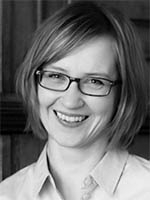Dr. Anna Mrozek

Areas of interest
- Human Rights and International law
- European law and politics of border management
Secularities in complex correlation. The relationships between state, religion and individuals within the Indonesian constitutional framework
This research project aims to describe the status quo of Indonesian secularity. To this end, the text of the Indonesian Constitution will serve as an emic taxonomy for differentiating between religious and secular discourses in the particular context of the Indonesian approach to secularity. A further aim of this project is to allocate these discourses in the broader legal context of the debates on the universalism and cultural relativism of human rights concepts.
In the context of the modern global order, interaction between religion and other social functional areas is mainly embedded within the political order unit ”state”, that is legally still defined by the elements of territory, people and governmental power. This perspective is, indeed, strongly connected to the formation of nation states in the context of Christianity, and may not be extrapolated generally on a global historical scale. Nevertheless, if we recognise that the relationship between religion and other social functional areas is being shaped within, even if not necessarily only by, the state order, then a more general assumption could be made, that different sets of norms, and therefore also sets of religious and state norms, primarily encounter each other horizontally, more or less overlapping and need to be shifted into a more vertical relationship within the state order, with one or the other prevailing in the case of conflict. Given that religious freedom is a universally recognised human right, its legal anchoring, even if state-determined, goes beyond the general relationship between state and religion, and can be viewed in the light of “culturally and symbolically as well as institutionally anchored forms and arrangements of differentiation between religion and other social spheres” (Wohlrab-Sahr/Burchardt).
The Indonesian Constitution was not only an act of independence, but also an act to “unite in diversity” a highly pluralistic society, in which different sets of norms had already coexisted. Being the state with the largest Muslim community in the world, it is striking that there is no direct reference to “Islam” and “Muslim” in the text of the Indonesian Constitution. More than this, the implicit reference to Islam as a state principle has been rejected in debates on behalf of the Pancasila. However, the reference to “God” is strong, with the Pancasila basing the Indonesian state on the belief in the “one and only God”.
Biography
Assistant Professor, Chair of Public Law, State and Constitutional Theory, Leipzig University (Germany)
Lecturer, European Legal Studies, Europa-Kolleg Hamburg (Germany)
PhD (Promotion), Faculty of Law, Leipzig University
Mentor German Chancellor Scholarship of the Alexander von Humboldt Foundation
Attorney at Law (private practice Berlin)
Research Assistant, Chair of Public Law, State and Constitutional Theory, Leipzig University
Second state law examination, Leipzig University
Legal Clerkship in Berlin and New Zealand (Maori Legal Services, Wellington)
Legal Assistant at the Federal Office for Special Reunification Issues (Bundesanstalt für vereinigungsbedingte Sonderaufgaben, Finanzierungs- und Beratungsgesellschaft mbH)
First state law examination, Leipzig University
Studies of Law at the Humboldt University Berlin and the University College Dublin, Ireland (Erasmus)
Relevant Publications
- Enders, Christoph, Afifah Kusumadara, and Anna Mrozek. United in Diversity: Freedom, Property and Property Rights. Leipzig: Leipziger Universitätsverlag, 2014.
- Mrozek, Anna. “The Concept of Diversity in a Nation State: Between Integration, Tolerance and Exclusion,” in United in Diversity. Framing Diversity in Indonesia and Germany. Edited by Christoph Enders and Afifah Kusumadara, 35–46. Leipzig: Leipziger Universitätsverlag, 2012.


